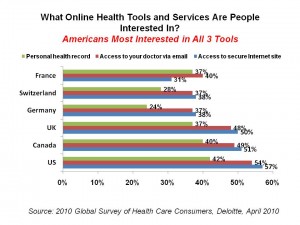In the global village of health care, where do Americans stand on issues compared with fellow health citizens in Canada, France, Germany, Switzerland and the United Kingdom?
Deloitte Center for Health Solutions asked this very question and found some intriguing differences between people from six of the wealthiest countries on the planet.
The most striking difference between the U.S. health system and the other 5 analyzed by Deloitte is that the U.S. has an employer-sponsored financing system coupled with public sector sponsorship for Medicare and Medicaid, along with health plans for Veterans and armed forces and their families. But it’s not only Americans who feel health financial insecure; while 39% of Americans say they’re adequately insured, 29% of Swiss, 25% each of French and Canadians, 22% of Germans and 20% of Britons feel adequately insured. Thus, a guarantee of a health plan in other developed countries does not mean health citizens don’t feel under-insured.
21% of Americans don’t believe they’re financially prepared to handle future health costs — second most vulnerable only to Germans. Canadians, with the single payer health system, seem most health-fiscally secure, although that’s only 39% of all Canadians who feel this way.
The U.S. is #1 when it comes to being interested in using online tools and services for managing their health. In particular, it’s striking that 54% of Americans want to email their doctor, compared to a low of 37% of Germans and Swiss citizens.
Fewer than 10% of health citizens in all six countries maintain personal health records. Nonetheless, there is pent-up demand for PHRs: 42% of Americans say they’re interested in adopting personal health records. Interest in access to the Internet for health information is highest among Americans, Canadians, and Britons, with a fairly sharp drop-off for Germans, Swiss and French.
The issue of privacy risks of digital personal health information is much more acute among Swiss and Germans than among health citizens from the other 4 countries. 53% of Swiss and 52% of Germans are highly concerned about privacy of health information stored on a computer compared with 38% of Americans.
Americans, Britons and Canadians all want to adopt remote monitoring devices and in-home medical devices in roughly equal proportions: about 2/3 each.

Household spending on health care products and services increased for a plurality of Swiss, Americans, French and Germans in 2009. And only 21% of Americans awarded their health system and “A” or “B” grade, the lowest percentage appreciation of all countries studied except for Germany,17% of whose citizens gave their nation an “A” or a “B.” In this instance, it’s good to be French or Swiss, as 55% of their citizens gave their countries an “A” or a “B” grade as a health care system.
Deloitte’s study points out the global health reality that no nation’s citizens are universally happy with their health systems, whether single payer or mixed public-private. What is emerging among these six nations is a portrait of health citizens who are embracing tools and services and at-home medical products that help them care more for themselves. The universal truth is that no nation can support 100% of the health needs of its people — and people in developed countries will be paying more out of pocket, and spending more personal time, taking care of their personal health and the health of their loved ones.





 I'm in amazing company here with other #digitalhealth innovators, thinkers and doers. Thank you to Cristian Cortez Fernandez and Zallud for this recognition; I'm grateful.
I'm in amazing company here with other #digitalhealth innovators, thinkers and doers. Thank you to Cristian Cortez Fernandez and Zallud for this recognition; I'm grateful. Jane was named as a member of the AHIP 2024 Advisory Board, joining some valued colleagues to prepare for the challenges and opportunities facing health plans, systems, and other industry stakeholders.
Jane was named as a member of the AHIP 2024 Advisory Board, joining some valued colleagues to prepare for the challenges and opportunities facing health plans, systems, and other industry stakeholders.  Join Jane at AHIP's annual meeting in Las Vegas: I'll be speaking, moderating a panel, and providing thought leadership on health consumers and bolstering equity, empowerment, and self-care.
Join Jane at AHIP's annual meeting in Las Vegas: I'll be speaking, moderating a panel, and providing thought leadership on health consumers and bolstering equity, empowerment, and self-care.